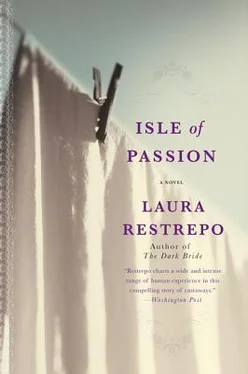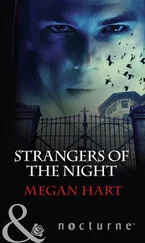The dead disappeared underground, and the living scattered in the storm. Only a small group of men stayed by the grave, keeping company with Sergeant Irra, who had just buried his whole family. Without a word, they knew what they wanted to do. They walked slowly toward the lighthouse lair, all with a single aim, a single will. They found Victoriano lying in his hammock, still alive, and bludgeoned him until they felt he was dead. “We did the right thing,” they wrote on the earth floor of the cabin.
Doña Juana the midwife, Jesús Neri’s widow, had become an ill-tempered, mad loner. She had no home — nobody remembered whether her house had collapsed or had been blown away by the hurricane or dragged off by the floods — and she wandered around with her belongings on her back. Life in the open had shrunk, wrinkled, and darkened her skin like a raisin. During the day she kept mumbling, and at night she lulled herself to sleep as if she were her own child. The others forgot about her and would greet her only in passing, “Morning, Doña Juana,” or “Good morning, Doña Juana.”
“What’s ‘good’ about it?” she would mumble, though nobody paid attention. “There are only bad ones and worse ones.”
When the scurvy condition worsened, they remembered her.
“The midwife could help us with our sores!”
They looked for her by the lagoon, under the pile of rubble and garbage where she had taken refuge, and she came out dressed in rags. She stood on a mound of rocks and spoke about the devil. Clipperton was living in sin, “like Sodom and Gomorrah,” she preached, “and the plague was God’s punishment. Men and women were living together without the sacred sanction, and the children were growing up without being baptized.” She would take care of them, she promised, provided they first achieved peace with their consciences. It was easy for her to convince them. She conducted marriage ceremonies, blessing the pathetic brides and grooms ravished by disease. She held communal baptisms, making the little ones go into the rotten waters of the lagoon up to their knees. Her regalia as priestess for these occasions was really striking. To the various rags, she added pelts from dead animals, and on her head she wore an old lamp shade decorated with tassels all around. At one end of a long stick, which she used as a bishop’s crosier, she had attached a porcelain doll.
Notwithstanding their repentance, their prayers and sacraments, the faithful continued to writhe in pain. The midwife then complemented her mysticism with medicine. She prepared infusions with turkey feathers, sea urchin shells, bat pee, and toad milk. She applied leeches, vents, and guano poultices. The sick stopped going to the pharmacy for their daily ration of coconut, and established themselves at the shore of the lagoon, all around the midwife’s hovel. Their days and nights were divided either between moans and agonies, or prayers and processions.
The death toll kept increasing, and the living became impatient waiting for a miracle cure. The midwife expanded her gospel repertoire. She told them that there was poison in the air, and ordered people to light bonfires to cleanse it and to feed the fires with the belongings of those who died. So, into this purifying fire went scapulars, combs, petticoats, shirts, love letters, toys: the last remaining family memories, the few friendly objects that were left, minute traces of a bygone world.
But nobody was getting better; they all got worse. Their skin fell off in scales, and their flesh was raw. With their lowered defenses, other diseases took hold: anemia, rheumatic fever, bronchitis, leukemia, diarrhea, depression.
The faithful were losing patience.
“You lying hag, if you don’t cure us, we’ll throw you into the lagoon,” the people shouted at her one day in the middle of one of her rituals.
Then she demanded sacrifices. She said that the sins had been so numerous that only blood could wash them away. Dutifully, they threw into the fire a whole litter of newborn piglets. A new brotherhood of flagellants was formed, and they went around the island flailing their backs.
The flagellants, led by Sergeant Irra, punished themselves and everything around them. Weak and in pain, they were nonetheless a pitiful horde of hooligans and predators. Their emblem was to carry a handful of hair that each had pulled out from someone’s corpse; their slogan, “Long Live Death”; and their hymn, the “Salve Regina, Empress of Heaven.” Using the same whips and heavy sticks with which they mortified their flesh, they killed all the animals and destroyed all structures and water tanks, as well as ransacked the food depot. They would have cut down the palm trees with their machetes, had Arnaud and Cardona’s gunshots not prevented them.
As long as Ramón was in control, burials were made in the cemetery. But when Clipperton became a no-man’s-land, each one dug a hole for his dead wherever he could. The island was dotted with graves. Sometimes — though not often — their presence was indicated by a wooden cross or a heap of stones. At the end, when the living were fewer than the dead, and the presence of death became overwhelming, they threw the corpses into the lagoon or into the sea.
Arnaud’s authority had collapsed. He and his military orders and coconut milk could not compete with Doña Juana’s magical, mystical influence. In one last attempt to bring this pandemonium to some semblance of order, he walked to the lagoon with the clear intention of confronting the old woman.
“You are no priestess, and no doctor. You’re nothing!” he shouted in the presence of her followers. “You’re nothing but a deranged old woman, and I forbid you to keep on driving these people mad.”
“You are not in charge anymore, Arnaud,” she countered. “And neither am I. This is the reign of death. Go and die in peace, and let others die the way they want to.”
Ramón walked away from the place without a word, and resolved to keep to himself at home with his family, Altagracia, Tirsa, Cardona, three widows, and one orphan. The isle became two domains — the midwife’s colony and the Arnaud home — that had less and less contact with each other, each side finally ignoring the other as if they were an ocean apart.
Those who stayed in the house organized a guard duty day and night to prevent an attack from the flagellants, and, against all hopes, they kept eating coconut and drinking an infusion made with the shells. Not even Arnaud did it out of conviction. For him this irrational gesture only embodied the remnants of his will to live.
Though the curtain of water falling from the skies did not abate, some signs from the other side were perceived. Laments from those dying, smoke from the bonfires, hymns from the flagellants. At night the sounds became weaker, more surreal, like voices from the other world that were growing fainter. Like the echoes from a nightmare when one is about to wake up.
Then the rains suddenly stopped. The sky changed colors, like a snake changes skins, and the color it finally acquired was a limpid, innocent blue. The Arnauds and their three children, the Cardonas, and the rest of those in the house were still alive. Besides, they were healthy. They were the only survivors on Clipperton Island.
“Blessed are the holy coconuts,” Ramón said, and went out with his children to the beach to welcome the sunshine.

“SECUNDINO, A SHIP is going by!” shouted Ramón Arnaud one quiet, gray morning.
Everything seemed to be at peace, except for the ocean. In between the lazy stillness of the sky and that of the land, the sea in frantic waves exploded on the reefs.
Читать дальше













